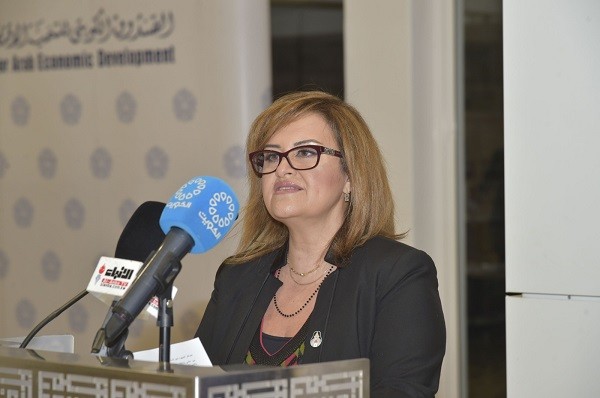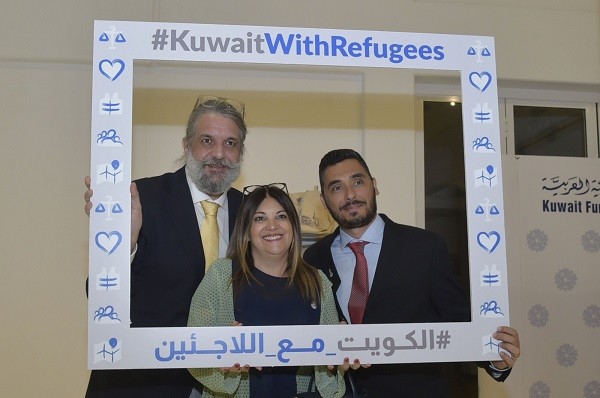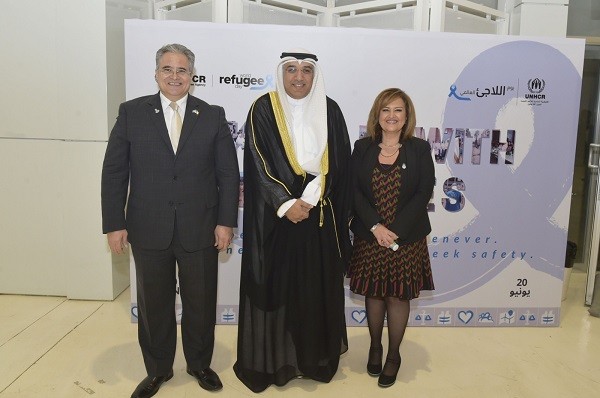The liaison office in Kuwait of the United Nations High Commissioner for Refugees (UNHCR) organized an event on 20 June to mark World Refugee Day at the Dar Al-Attar Al-Islamiyyah (DAI). The event was held under the patronage of the Minister of Foreign Affairs Sheikh Ahmad Nasser Al-Mohammad Al-Sabah, and attended on his behalf by Ambassador Abdulaziz Al-Jarallah.

Hosted by Co-founder and Director-General of DAI, Sheikha Hussa Sabah Al-Salem, the event commemorated World Refugee Day and helped raise awareness on the Day’s theme for 2022 — ‘Whoever, whatever, whenever. Everyone has got a right to seek safety’. UNHCR partners from the government, members of the diplomatic corps and representatives from international organizations in Kuwait attended the event, along with philanthropists and artists who displayed paintings that focused on the Day’s theme.
UNHCR aimed to highlight the plight of refugees and the need to provide solutions to protect them. Refugees and displaced persons around the world face persecution, poverty and insecurity that were exacerbated by the socio-economic and political challenges triggered by COVID-19. The refugee experience is accompanied by severe health and medicine services shortages, with an appalling lack of humanitarian operations.
Conflicts and wars in Afghanistan and Ukraine have resulted in the number of displaced people reaching record highs. According to UNHCR’s latest Global Trends report, children account for 42 percent of all refugees, and developing and least developed countries carry a significant burden of refugee migration.

Refugees are prone to migration towards neighboring countries, and 72 percent of displaced people have moved to the closest state. Often, the same states hosting these refugees are ridden with internal conflict. Turkey currently hosts 3.8 million refugees, the most significant number worldwide, followed by Uganda and Pakistan(1.5 million) and Germany (1.5 million). Per capita, Lebanon, Jordan, and Turkey are ranked the highest for hosting refugees. More than two-thirds of the refugee population come from five countries: Syria, Venezuela, Afghanistan, South Sudan, and Myanmar.
Speaking on the occasion, UNHCR Representative in Kuwait Nasrin Rabian highlighted her experience with refugees and their displacement, emphasizing a quote from her colleague, “That what unites us as human beings in our humanity more than what divides us as citizens with geographical boundaries.” She added that “with its wise vision the Government of Kuwait initiated the infrastructure for UN humanitarian partnership with the private and charitable sector, and we have a fruitful partnership with the charitable and Islamic sector, civil society associations, the telecommunications sector, the banking and investment sector, and the industrial sector.”
For his part, Ambassador Jarallah stated: “Kuwait is not alien to the refugee field or file, and we always have a special interest that we present as a moral, religious and political duty to support the oppressed everywhere.” He went on to add, “Kuwait, even though it is a small and developing country, its voice reaches the farthest place, and we continue in this policy and under the directives of the political leadership, as well as the government and the people who support helping the meek.”
Expressing his pride in the appreciation that Kuwait enjoys from the United Nations, Ambassador Jarallah noted that the UN had presented the late Amir Sheikh Sabah Al-Ahmad Al-Jaber Al-Sabah with its prestigious ‘Humanitarian Leader’ award, and recognized Kuwait as a hub for humanitarian actions.
By Fatima Al Attar
Special Correspondent























